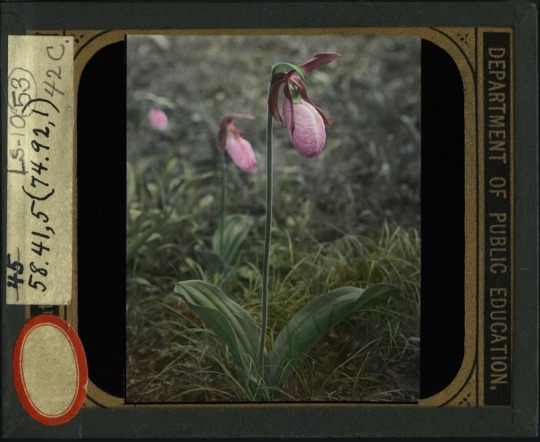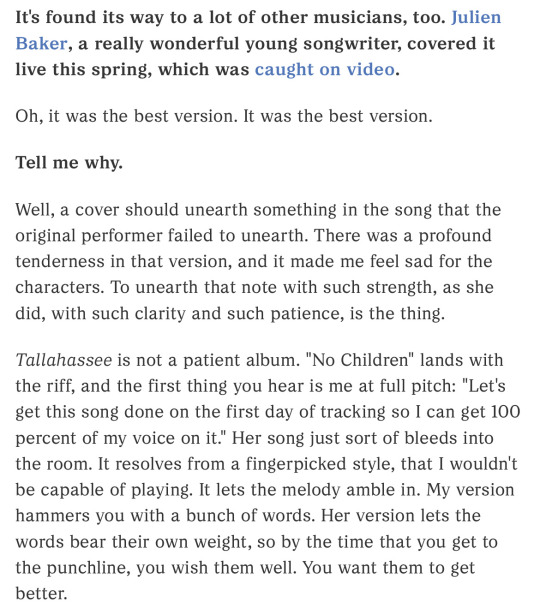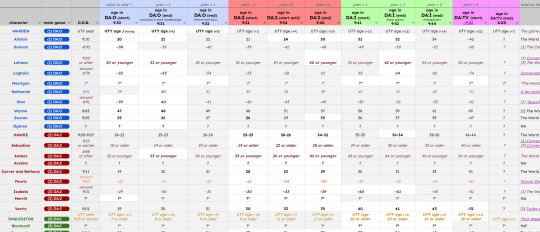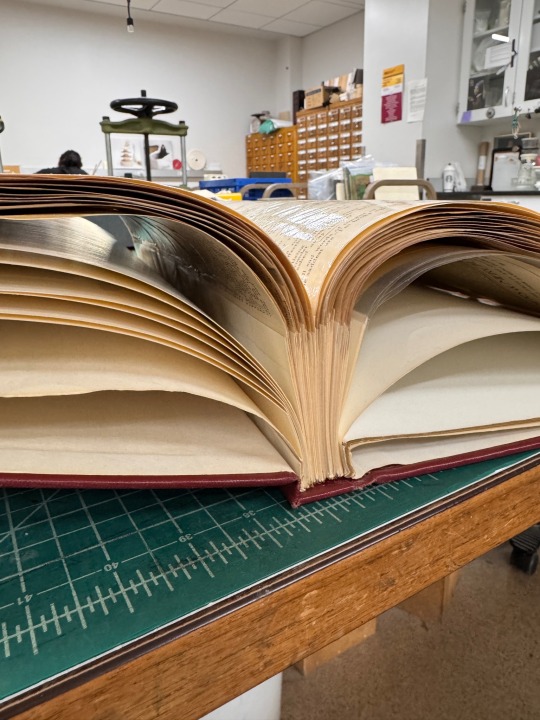#archival ..
Explore tagged Tumblr posts
Text

#antique#antique photo#vintage aesthetic#slide photo#film photo#film photography#flowers#nature#naturecore#green aesthetic#whimsigoth#whimsicore#rosieandthemoon#plants#curator#museum#archival#fairycore#green witch#witchy things#moody#dark bohemian#green#pink#artifact#aes#moody landscape#moody aesthetic#nature goth#goth fairy
165 notes
·
View notes
Text
That a major social media platform that's been around for two decades going down without proper archiving would represent a greater loss of human culture than any library that's ever burned is undeniably true, but it's also a very funny observation to make about Tumblr in particular.
6K notes
·
View notes
Text
Julien Baker covers No Children by the Mountain Goats + an introduction from John Darnielle
➕

Excerpt from “I Hope We Both Die: How The Mountain Goats Wrote The Ultimate Anthem To Dysfunction” an interview with John Darnielle
#julien baker#john darnielle#boygenius#the mountain goats#no children#2018#april 2018#video#interview#archival
10K notes
·
View notes
Text
This is your daily reminder to archive your favorite fandom stuff!!!
I've been a voracious archivist/data hoarder ever since I first got access to a computer, and it's paid off more times than I can count. Just the other day I came across a PDF copy of an analysis post for one of my fandoms. The post was made on an old forum and is the most detailed and interesting analysis of a particular story element I've ever seen. Back in like 2012 I saved the post as a PDF, because even then I saved everything I liked.
Anyway, flash forward to 2025 and I decided to see if the URL included in the document was still live. I wasn't very surprised to see that the forum is long dead. However, even the Wayback Machine had no record of this thread. If I hadn't saved a copy of it way back when, I would have never, ever been able to read this analysis again!
The Internet Archive is sadly not infallible, especially when it comes to things like forum threads. You can do your part by manually saving things to the Wayback Machine, but I also recommend keeping your own archives. Aside from just saving pages as PDFs, I highly recommend a browser extension called SingleFile that lets you archive pages as HTML files.
#I will never shut up about archival btw#I will be on my death bed and my last words will be telling my grieving family to invest in an external hard drive#archival#data hoarding#fandom archival#archiving#internet history#internet archive#1k
1K notes
·
View notes
Text
Christian Dior Haute Couture Spring/Summer 1998 Designed By: John Galliano

#hautefashion#haute couture#christian dior#Dior 1990#Dior 1998#john galliano#old money#wealth#fashion design#jewelry#silver#sterling silver#chrome hearts#Chanel#fashionhouses#archival fashion#archival
3K notes
·
View notes
Text
take some time this week to archive online content you care about, it could disappear or get harder to find at any point! youtube channels, blogs, images, personal chat logs, you name it
11K notes
·
View notes
Text
A Comprehensive List of Pre-21st Century Lesbian Films
There seems to be a lot of interest in older/more niche films with lesbian themes so I've been putting together this list. I'm going to keep adding to it as I find more films so feel free to let me know if I'm missing anything! Enjoy!
Quick disclaimer: Some of these films contain problematic elements such as racism, homophobia, sexism and so on. This list is not an endorsement of all these films, it is only for archival purposes. As I have not seen all these films I cannot provide accurate content warnings, so please do your own research before watching.
1880 - 1919
The Kiss (1882), Dir. Eadweard Muybridge [SHORT, SILENT, ZOOPRAXISCOPE]
Pierrette’s Escapades (1900), Dir. Alice Guy [SHORT, SILENT, HAND TINTED]
At the Floral Ball (1900), Dir. Alice Guy [SHORT, SILENT, HAND TINTED]
Midwife to the Upper Class (1902), Dir. Alice Guy [SHORT, SILENT, COMEDY]
The Jester’s Joke (1910), Dir. Walter R. Booth [SHORT, SILENT, COMEDY]
Zapata’s Gang (1914), Dir. Urban Gad [SILENT, CRIME, COMEDY]
Filibus (1915), Dir. Mario Roncoroni [SILENT, HEIST, ACTION]
1920-1939
Manslaughter (1922), Dir. Cecil B. Demil [SILENT, DRAMA]
The Girl in Tails (1926), Dir. Karin Swanstrom [SILENT, COMEDY]
Wings (1927), Dir. William A. Wellman [SILENT, WAR, ACTION]
Pandora’s Box (1929), Dir. G.W. Pabst [SILENT, DRAMA]
Diary of a Lost Girl (1929), Dir. G.W. Pabst [SILENT, DRAMA]
Morocco (1930), Dir. Josef von Sternberg [DRAMA, ROMANCE]
Mädchen in Uniform (1931), Dir. Leontine Sagan [DRAMA, COMING OF AGE]
Queen Christina (1933), Dir. Rouben Mamoulian [DRAMA, PERIOD]
Dragnet Girl (1933), Dir. Yasujirō Ozu [CRIME]
Fukujuso (1935), Dir. Jiro Kawate [SILENT, DRAMA]
The Tomboy (1936), Dir. Jean de Limur [DRAMA]
Girls’ Club (1936), Dir. Jacques Deval [COMEDY, CRIME]
1940-1959
Jenny Lamour (1947), Dir. Henri-Georges Clouzot [CRIME, DRAMA]
Thirst (1949), Dir. Ingmar Bergman [DRAMA]
Caged (1950), Dir. John Cromwell [DRAMA]
Girl with Hyacinths (1950), Dir. Hasse Ekman [MYSTERY, NOIR]
Olivia (1951), Dir. Jacqueline Audry [DRAMA]
No Exit (1954), Dir. Jacqueline Audry [DRAMA]
La Garçonne (1957), Dir. Jacqueline Audry [DRAMA]
The Twilight Girls (1957), Dir. Andre Hunebelle [COMEDY, DRAMA]
Mädchen in Uniform (1958), Dir. Geza von Radvanyi [DRAMA, COMING OF AGE, REMAKE]
1960-1969
Blood and Roses (1960), Dir. Roger Vadim [VAMPIRE, HORROR, EROTIC]
Léon Morin, Priest (1961), Dir. Jean-Pierre Melville [DRAMA]
The Girl with the Golden Eyes (1961) Dir. Jean-Gabriel Albicocco [DRAMA]
The Children’s Hour (1961), Dir. WIlliam Wyler [DRAMA]
Walk on the Wild Side (1962), Dir. Edward Dymitrik [DRAMA]
Manji (1964), Dir. Yasuzo Masumura [DRAMA]
With Beauty and Sorrow (1965), Dir. Masahiro Shinoda [DRAMA]
Faster, Pussycat! Kill! Kill! (1965), Dir. Russ Meyer [EXPLOITATION]
Daisies (1966), Dir. Věra Chytilová [AVANT GARDE, COMEDY, DRAMA]
The Group (1966), Dir. Sidney Lumet [DRAMA]
La Religieuse (1966), Dir. Jacques Rivette [DRAMA]
Persona (1966), Dir. Ingmar Bergman [AVANT GARDE, PSYCHOLOGICAL, DRAMA]
Belle De Jour (1967), Dir. Luis Bunuel [DRAMA]
The Fox (1967), Dir. Mark Rydell [DRAMA]
Les Biches (1968), Dir. Clauthde Chabrol [DRAMA, EROTIC]
The Killing of Sister George (1968), Dir. Robert Aldrich [DRAMA, EXPLOITATION]
Therese and Isabelle (1968), Dir. Radley Metzger [ROMANCE, DRAMA, EROTIC]
The Girl from Pussycat (1969), Dir. Smythe David [SEXPLOITATION]
Check to the Queen (1969), Dir. Pasquale Festa Campanile [DRAMA, EROTIC]
The Others (1969), Dir. Renzo Maietto [DRAMA]
1970-1979
Valerie and Her Week of Wonders (1970), Dir. Jaromil Jires [AVANT GARDE, DRAMA, COMING OF AGE]
Beyond the Valley of the Dolls (1970), Dir. Russ Meyer [COMEDY, MUSICAL, MELODRAMA]
Midnight Virgin (1970), Dir. Shogoro Nishimura [DRAMA, EROTIC]
The Conformist (1970), Dir. Bernardo Bertolucci [POLITICAL DRAMA]
Multiple Maniacs (1970), Dir. John Waters [COMEDY]
The Dark Side of Tomorrow (1970), Dir. Jack Deerson, Barbara Peeters [DRAMA]
Nightmares Come at Night (1970), Dir. Jesús Franco [DRAMA]
The Vampire Lovers (1970), Dir. Roy Ward Baker [VAMPIRE, HORROR, EROTIC]
The Shiver of the Vampires (1971), Dir. Jean Rollin [VAMPIRE, EROTIC]
Girl Slaves of Morgana Le Fay (1971), Dir. Bruno Gantillon [EROTIC]
Daughters of Darkness (1971), Dir. Harry Kumel [VAMPIRE, EROTIC]
Vampyros Lesbos (1971), Dir. Jesús Franco [VAMPIRE, EXPLOITATION, EROTIC]
Daughter of Dracula (1972), Dir. Jesús Franco [VAMPIRE, EROTIC]
Intimate Confessions of a Chinese Courtesan (1972), Dir. Chor Yuen [MARTIAL ARTS, DRAMA, EROTIC]
The Bitter Tears of Petra von Kant (1972), Dir. Rainer Werner Fassbinder [DRAMA]
The Beguines (1972), Dir. Guy Casaril [DRAMA, EROTIC]
Don Juan or If Don Juan Were a Woman (1973), Dir. Roger Vadim [DRAMA, EROTIC]
Lemora: A Child’s Tale of the Supernatural (1974), Dir. Richard Blackburn [HORROR, COMING OF AGE]
Vampyres (1974), Dir. Jose Ramon Larraz [VAMPIRE, EXPLOITATION, EROTIC]
Foxy Brown (1974), Dir. Jack Hill [BLAXPLOITATION, ACTION]
Je Tu Il Elle (1974), Dir. Chantal Ackerman [DRAMA]
Black Emanuelle (1975), Dir. Bitto Albertini [SEXPLOITATION]
Successive Slidings of Pleasure (1974), Dir. Alain Robbe-Grillet [HORROR, AVANT GARDE, EROTIC]
Picnic At Hanging Rock (1975), Dir. Peter Weir [MYSTERY, DRAMA]
Word Is Out: Stories of Some of Our Lives (1977), Dir. Mariposa Film Group, et. al [DOCUMENTARY]
Bilitis (1977), Dir. David Hamilton [EROTIC]
Alucarda (1977), Dir. Juan López Moctezuma [VAMPIRE, HORROR, EXPLOITATION]
Fascination (1979), Dir. Jean Rollin [VAMPIRE, HORROR, EROTIC]
See Here My Love (1979), Dir. Hugo Santiago [MYSTERY, DRAMA]
1980-1989
Simone Barbes or Virtue (1980), Dir. Marie-Claude Treilhou [DRAMA]
Personal Best (1982), Dir. Robert Towne [SPORTS, DRAMA]
Scrubbers (1982), Dir. Mai Zetterling [DRAMA]
The Living Dead Girl (1982), Dir. Jean Rollin [ZOMBIE, HORROR]
Audience (1982), Dir. Barbara Hammer [DOCUMENTARY]
The Hunger (1983), Dir. Tony Scott [VAMPIRE]
Lianna (1983), Dir. John Sayles [DRAMA]
La Pirate (1984), Dir. Jacques Doillon [DRAMA]
Desert Hearts (1985), Dir. Donna Deitch [ROMANCE, DRAMA]
Anne Trister (1986), Dir. Lea Pool [DRAMA]
Kamikaze Hearts (1986), Dir. Juliet Bashore [DOCUFICTION]
Working Girls (1986), Dir. Lizzie Borden [DRAMA]
I’ve Heard the Mermaids Singing (1987), Dir. Patricia Rozema [COMEDY]
No No Nooky T.V. (1987), Dir. Barbara Hammer [COMEDY, SHORT]
1990-1999
The Company of Strangers (1990) Dir. Cynthia Scott [DOCUFICTION]
Women Like Us (1990), Dir. Suzanne Neild [DOCUMENTARY]
Salmonberries (1991), Dir. Percy Adlon [DRAMA]
Thelma & Louise (1991), Dir. Ridley Scott [CRIME, DRAMA]
Twin Peaks: Fire Walk with Me (1992), Dir. David Lynch [HORROR, AVANT GARDE]
Nitrate Kisses (1992), Dir. Barbara Hammer [DOCUMENTARY]
Flaming Ears (1992), Dir. A. Hans Scheirl, Dietmar Schipek, and Ursula Pürrer [AVANT GARDE, SCI-FI]
Forbidden Love (1992), Dir. Lynne Fernie, Aerlyn Weismann [DOCUFICTION]
Fresh Kill (1994), Dir. Shu Lea Cheang [SCI-FI, AVANT GARDE]
Heavenly Creatures (1994), Dir. Peter Jackson [CRIME, THRILLER, BIOPIC]
Go Fish (1994), Dir. Rose Troche [COMEDY, DRAMA, ROMANCE]
The Maidens of Heavenly Mountains (1994), Dir. Andy Chin Wing-Keung [WUXIA]
The Celluloid Closet (1995), Dir. Rob Epstein & Jeffrey Friedman [DOCUMENTARY]
The Incredibly True Adventure of Two Girls in Love (1995), Dir. Maria Maggenti [COMEDY, DRAMA]
When Night is Falling (1995), Dir. Patricia Rozema [DRAMA]
Live Nude Girls (1995), Dir. Julianna Lavin [COMEDY]
BloodSisters: Leather, Dykes, and Sadomasochism (1995), Dir. Michelle Handelman [DOCUMENTARY]
Bound (1996), Dir. The Wachowskis [CRIME, THRILLER]
The Watermelon Woman (1996), Dir. Cheryl Dunye [ROMANCE, DRAMA, COMEDY]
Everything Relative (1996), Dir. Sharon Pollack [COMEDY, DRAMA]
Irma Vep (1996), Dir. Olivier Assayas [DRAMA]
Nowhere (1997), Dir. Gregg Araki [BLACK COMEDY, DRAMA]
Gia (1998), Dir. Michael Cristopher [BIOPIC]
High Art (1998), Dir. Lisa Cholodenko [DRAMA]
Election (1999), Dir. Alexander Payne [COMEDY]
Better Than Chocolate (1999), Dir. Anne Wheeler [ROMANCE, COMEDY]
Being John Malkovich (1999), Dir. Spike Jonze [COMEDY, FANTASY]
But I’m A Cheerleader (1999), Dir. Jamie Babbit [ROMANCE, COMEDY]
Adolescence of Utena (1999), Dir. Kunihiko Ikuhara [ANIME, DRAMA, COMING OF AGE]
#lesbian#wlw#dykeposting#sapphic#lesbian history#lesbian art#lesbian film#lgbt history#lgbt film#gay film#compilation#silent film#early lesbian film#film history#archival
607 notes
·
View notes
Text

510 notes
·
View notes
Text
(I wrote this article to help remind myself that even small actions like maintaining my microlibrary matters. I've included my methodology below and why I do it. I also includes some resources that go into further depth).
Archiving Our Works Offline
Since we are entering a fascist era where I live, archiving literature of all types becomes more pertinent. Especially with the current rise in book-banning and censorship (much of that focusing on marginalized groups like LGBTQIA people and Black and Indigenous people).
So how do we archive literature and keep knowledge safe from censorship or destruction by authoritarian regimes? There’s various methods, but I’ll speak of a way one can do this without a degree or beforehand knowledge of archival practices.
I’ve been archiving my eBooks and the studies I’ve read for a long time now, but it’s only recently I’ve been working on transferring them to a safer, offline drive. I also have a large physical library of books from various genres and covering many different topics. I collect books and can often find them cheap at book sale fundraisers, estate sales, sales in book stories, discounts in online stores, etc.
Due to how extensive my library is, it’s inspired my friends to read new authors or genres or to tackle new topics; the archive gave us room for discussion. It also helped friends or community members who don’t have access to a library still access a digital copy by checking-out a copy from me. Now, one doesn’t have to share their archive with anyone, but I find it helpful to do so.
The goal however should not be to archive the most famous books — as if everyone did that we wouldn’t preserve much knowledge, so focus on unique and lesser known literature and media to preserve those too. This is why I focus so much on marginalized authors, who are not well known.
Archiving knowledge is why physical libraries in a town is so crucial. They are bastions of knowledge and archived books, media, and documents. Supporting your local library and fighting with your library to keep them open is crucial. This also requires fighting against book bans that would censor/restrict what a library is allowed to put on their shelves and archives.
What I’m suggesting here isn’t to replace libraries. It’s to augment the community’s archives of knowledge, media, documents, and books. Since Public Libraries are the forefront of the fight against banned books, it can be crucial to make sure the banned or censored books are preserved somehow.
While the authoritarian state may easily target Public Libraries, they can’t so easily target civilians, especially if the archival project is done quietly among small groups of people. These smaller projects are how some of the lost knowledge from before the 1930s Nazi book-burnings were salvaged; everyday people like you and me archived books and documents and kept them safe.
Experts often discuss four stages to censorship:
Stage one: Not allowing certain topics to be discussed. This is similar to laws in Florida, where speaking of LGBTQIA folks (trans in particular) can be penalized. This primarily impacts schools, but not necessarily the publishing industry as a whole.
Stage two: Bills that censor the Internet. The terrible KOSA bill (Kids Online Safety Act) is an example, where it sought to censor the existence of LGBTQIA and/or Black and Indigenous literature, media, and documents on the Internet. This is where sites that carry these media may start to go dark digitally.
Stage three: Penalizing anyone who sells, disseminates, or produces censored materials. This is when authors, publishers, bookstore owners, libraries, and others are attacked directly and penalized for having any literature or media the state deems ‘bad.’ The penalty can range from fines to jail time to death.
Stage four: book burnings. This is full-on blatant Nazi-esque book burnings and trashing of any institution or public archive of knowledge and media that holds the censored materials. For example, the Sex and Gender Institute in Germany in 1930s was the first targeted institution for book burnings by Nazis. A century worth of data on LGBTQIA (and specifically trans and intersex individuals) were lost. The only remnants that survived was documents smuggled out before the book burnings.
For the country in which I reside, we are hovering between stage one and two. I suspect by the end of these four years, we’ll be closer to stage three. This is why it’s crucial to keep an archive of knowledge, and if many people are doing this, the higher likelihood that more data can be preserved. It may seem daunting, but that’s why it’s helpful to work with other people and focus on a specific genre or topic for the archival project you start.
I personally started with Leftist books focused on anti-capitalism, anti-racism, building communes, and science fiction and fantasy by marginalized authors. I was a little broad in my choice of topics, but there’s no need to be this broad.
For example, one could pick to archive only trans literature or only literature by Indigenous authors. Also remember, you cannot archive every book in your chosen topic. You will be curating these archives to some degree because that’s inescapable. Do not fret over this or agonize over being unable to archive all the books.
Preserving some knowledge is better than losing it all. That’s the goal. Take it a step at a time. For me, I’ve been adding to my archive for over four years. It’s sitting at around 25 gigabytes, and it’s something I added to slowly over that time. I took breaks. I set aside time each month to update the archive, and I asked others for help during high pain times. (This was helpful during the start of Covid, where I started up a digital archive of studies. Friends helped catalog them.)
Preserving knowledge and literature is crucial in times where censorship and book bans are on the rise. There’s a lot of great knowledge, literature, and media out there that should be preserved for future people to read or watch.
When an authoritarian regime starts to censor the sharing of knowledge, data, and stories, this is when archival practices become crucial for the survival of people’s history, culture, and stories. Anyone can work on an archival project, though I recommend building up a group to help make it easier in the long run.
1. Hardware.
Obtain a large storage drive, as in a 1 or more terabyte SSD drive. This will serve as the data repository for the digital portion of the archive. This drive must not be used regularly. It’s meant to store the data, then be placed in a safe storage area (at just the right temperature to avoid degradation of the drive).
Since books can range in size, multiple storage drives may be needed. If one is seeking to also rescue/archive media such as photographs, videos, music, podcasts, etc — then you’ll need larger storage drives. This storage drive should not be connected to the Internet in any way. It’s meant as an offline archival device.
Servers can also be used as archives, where the data is stored on the server, but a server is connected to the Internet. Depending on the circumstances, it may not be wise to have the back-up archive in the cloud. A back-up should be stored offline for any archive security.
Try to avoid cloud storage, especially if based in the USA. Do not use googledrive or dropbox or any similar cloud storage. If you must use cloud storage, always have an offline backup on your own SSD drives, and seek out a storage service that is based in a country with good privacy laws that has encryption embedded in it such as cryptpad.org.
Next make sure the computer hardware needed to open those drives are kept in top-notch shape. The digital archive will end up useless if there isn’t a device capable of connecting with the storage drive. Most devices with USB ports have the capability to connect to a storage drive.
2. File types.
You need to make sure the file types used in digital storage can be easily accessed by the majority of devices currently in existence. At this time of writing in January 2025, PDFs, ePub, .Doc, .mp3, .mp4, .wave, and .zip are the most common file types and the most accessible. Could this change in the next decade? Maybe, but for now, focus on the most common file types that are accessible by the majority of systems.
3. Avenues of procuring the literature for archiving.
There’s two forms of archival data: Physical form and Digital form.
For the physical form, that consists of print books, magazines, newspapers, photos, etc. These can be purchased online or in physical stores. They also can be traded for using a grey market system. (Grey market is where the item is obtained legally but then sold by someone who may not have a license to sell. Black market is when item is obtained illegally.) Physical forms of literature are the superior archival forms. Books can easily outlast our lifetimes if stored in a dry, lukewarm temperature storage space.
Digital forms do not have a physical version of the data. The storage device or server is the only sign it exists in the physical realm. Digital forms can be compressed into smaller file sizes for long-term storage. Buying eBooks is also cheaper than a print physical copy. There is also online PDF/eBook libraries where one can download the book for free (for legal reasons, I cannot recommend. For ethical reasons, I maintain archiving literature to make sure it doesn’t disappear or is destroyed by censorship is important in the long-term).
Once the item is procuring (in hopefully legal way as I in no way suggest breaking the law), then it becomes important to store it appropriately.
4. Storage of archival data and literature.
The storage drives in point 1 become crucial for the digital forms of literature and other data. Storage drives need to be kept in a relatively dry, cool space and kept offline. When I saw cool, I’m speaking of between 50 to 80 degrees Fahrenheit. Best to keep it at a steady temperature. I prefer 70 to 75 degrees Fahrenheit. This prolongs the shelf-life of your drive. To avoid stressing the drive by using it often, try to time the storage so that you store as many files as you can in one boot-up.
Another important component to using storage drives is the power of encryption. A drive can be encrypted, and the key needed to use it safely guarded. I’d recommend this only if there are concerns of increased scrutiny to penalize the possession of certain types of literature and archival documents and media.
For example, if a law is passed to ban trans or queer literature, there’s a few ways the law could be written: it can focus on who sells or prints this literature, which means possession of it is not part of the law. A second way is to penalize both selling, printing, and possession. It’s this latter form of law that needs to be watched out for, and if it comes to be, that’s when encrypting the drives and keeping that key safe is crucial.
I am not an encryption expert, however. So be sure to research encryption to determine the best way to build up this security.
For physical storage, the area needs to also be dry and in that same temperature range. Storage in bins such as metal or plastic bins can also help preserve the books and magazines. Finding a space big enough can be difficult. Sure, a storage center could be used, but if you lose access to it or one is raided, you’d have no control over rescuing your archive. Better to work with your community (and friends) to store it yourself, so you have control over who has access to it.
5. Building up these archival Libraries in your communities.
If this feels daunting, then take a step back and think about who you know that may be interested in assisting. You can then talk with those people and work out a system to spread the tasks and make the project less intense. By working together in community, you will lessen the risk of burnout, which is crucial since it can take anywhere from weeks to years to recover from burnout.
What is burnout? It’s when stress on the body and mind pushes one past their limits and causes illness — physical or mental illness. The body and mind are exhausted, and so activities becomes increasingly hard to do. The best way to avoid this is to share the burden in projects like these. Take breaks often to give your body and mind rest. Spend time with family and/or friends and/or pets to help recharge. Take some solitary time too.
Working with other people in community is crucial for surviving fascist regimes. We are not islands, as that saying goes, and even islands are not isolated and independent. For the island relies on the larger, interconnected ecosystems of earth to exist.
Mariame Kaba, who wrote ‘We Do This Till We Free Us,’ wrote about her father and something her father shared with her: “You have a responsibility to live in this world. Your responsibility is not just to yourself. You are connected to everyone…. because the world doesn’t work without everyone.”
We are interconnected with other people and the environment as a whole. No one is “self-made” as that is individualistic capitalist propaganda; all of us had people throughout our lives that taught us what we know, socialized us into society’s norms (or out of those norms), assisted us in hard times, and so forth. Humanity are inherently social creatures, so do not discount the power of community.
Resources
For ways to build up your own groups and communities, I recommend starting with Surviving the Future edited by Branson, Hudsen, and Reed and How We Show Up by Mia Birdsong. Group-building can be as simple as a book club, who meets monthly, deciding to take on archiving the books they read.
For further reading, the following article discusses archiving and rescuing trans literature, but it’s tips apply to everything I’ve discussed above and to many other types of literature: A Practical Guide To Resisting Censorship. It includes tips for ways people can work together to safeguard knowledge and literature, which is nicely organized based on your role in the literature ecosystem.
Feel free to share thoughts and tips below. :)
#archiving#archival#archives#knowledge#books#literature#organizing#microlibraries#micro-library#building community#building community knowledge
453 notes
·
View notes
Text
DRAGON AGE info spreadsheet
i've made THIS SPREADSHEET that has different information about Dragon Age media, such as:
· the canon ages of DA important characters · known info about the DATV companions · where you can find the DATV devs on social media · a tab with relevant links to archived lost media, interesting dragon age posts, official content, and other useful things like this sheet
everything with sources :)
(these images are previews. i strongly advice you to check the sheet itself and not these images for updated info in case there were mistakes, i added new stuff, for links and for better quality.)


some of the things i'll be adding to the sheet next are (probably):
· a sheet with all dragon age media in chronological order (+ relevant links) · visual references (official clear images of the companions mostly, + other things) · more characters in the "character ages" sheet (if there's an interest, let me know if that's the case) · and characters' nationalities (in-game and irl approximations)
keep in mind that there are spoilers all over it, for all games (even datv, who hasn't yet come out at the time of posting this) and for other dragon age media (books, comics, etc.) i did my best to add warnings though!
reach out to me (mostly here or twitter) if there are any mistakes, or if you have any sort of feedback regarding the contents, formatting or accessibility! i'd appreciate it a lot! and talk to me to if you'd be willing to collaborate with me for the upcoming information! i could use the help.
and if the link is broken:
if got it from a reblog, look at the original post and check if it works there (in case i changed it for whatever reason)
if not, just reach out to me (op)
there's more information on the sheet itself. make sure to scroll all the way down and to the right to see all of the sheet :]
i hope this is useful for someone. i did this because most people don't take the time to source their information, and i also find it more comfortable to have most stuff in one place. it took (and continues to take) a loooong time to do this lol it was exhausting. thanks for your attention!
#im gonna sleep now#dragon age#dragon age: origins#dragon age origins#dragon age 2#dragon age: inquisition#dragon age inquisition#dragon age: the veilguard#dragon age the veilguard#dao#da2#dai#datv#dav#da4#bioware#inquisition#da inquisition#da veilguard#da origins#da#archival#dragon age archive#dragon age references
660 notes
·
View notes
Text

McQueen ‘97
#vintage fashion#blue#blue cybercore#cybercore#cyberpunk#techno pagan#y2k futurism#2000s futurism#2000s tech#y2k aesthetic#y2k nostalgia#y2k moodboard#cybercore aesthetic#cyber goth#cyber y2k#y2kcore#90s fashion#90s#alexander mcqueen#high fashion#futurism#90s futurism#weirdcore#oddcore#weird fashion#archival#retro Cybercore#the matrix#technocore#techcore
306 notes
·
View notes
Text

#stonework#vintage#vintage art#carving#engraving#vintage engraving#whimsigoth#whimsical#mystical#whimsicore#witchy#witchcore#rosieandthemoon#moody#bohemian#dryad#mythology#spiritual#dark bohemian#antique#cemetery#archival#museum#curator#esoteric#symbols#clearpilled#botanical
135 notes
·
View notes
Text
This stupid idea* before I disbound it and made it better
*SOMEBODY** LAMINATED ISSUES OF OUR STUDENT NEWSPAPER FROM 1912 AND BOUND THEM WITH STUPID BIG STUBS IN THE 1970s

**Our FIRST UNIVERSITY ARCHIVIST AAAAARRRGFFFHGFFHHHHHGGGGHG [agonized warbling continues]
#original content#conservation#preservation#library#lamination is evil#archives#archiving#archive#archival#laminated#lamination#bookbinding#fail
173 notes
·
View notes
Text
Do you know how to store data to last decades? Are you overwhelmed by the task of archiving the trans internet?
Introducing TFR’s first guest column, “Archiving Your Trans Microlibrary” by my lovely editor @iwritethingssometimes , a practical guide to the techie side of literary preservation.
#trans fiction#trans literature#transfem#booklr#literature#books#trans literature preservation project#literary preservation#archival#archival work#digital archiving
251 notes
·
View notes
Text












hatsune miku ads/graphics ripped from miku.sega.jp on the wayback machine from its various states over the years
some of them are the same graphic but sized differently, so if you see doubles thats why.
243 notes
·
View notes